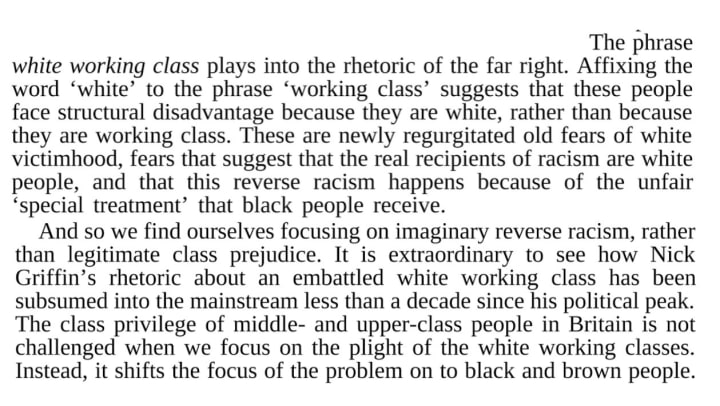Mind The Gap: Education & Employment Outcomes
We need to look in the right places to tackle systemic biases.

Earlier this month, Shadow Education Secretary Angela Rayner was quoted as having said that “white working-class boys are being left behind because of the 'negative impact' of a focus on ethnic minorities and women.” That’s not what she actually meant, but her clumsy wording did make it seem as though she was blaming affirmative action for the poor educational outcomes of indigenous British boys. What she says she actually meant is that immigrant families send stronger messages about the importance of education to their children, and white working-class families tend not to. Therefore a cultural change is necessary because white British boys have not been specifically targeted for additional support in the same way that ethnic minorities and female students have (which has generated improvements, demonstrating that the measures work and should be continued). She wasn’t saying that if we help people with one characteristic, we’re taking assistance away from another group; more that we need to focus on changing perceptions and attitudes so that British boys don’t sabotage their futures through lack of aspirations. But that doesn’t make as punchy a headline, so the Telegraph went for something that pushed the right-wing buttons instead.
The under-achievement of white British boys is not a new phenomenon. It was a problem when I was at school, and it has been reported year on year. At every level, in every subject, girls outperform boys, and (most) ethnic minority pupils excel where whites lag behind. This year, native British pupils had lower GCSE scores on average than children whose first language is not English. White pupils are less likely to go on to university, and universities offer schemes to encourage retention and success of women and minority students—because they are groups that have been left behind in the past, and we took the opportunity to redress the balance. So what do we say now? Has “equality gone too far”? Well, of course not. Unless,
- You don’t understand what “equality” means, or
- You’re going to attempt the “white people are so oppressed” line of argument (please don’t).
The disparity between racial and gender groups is significant, but in the order of a few percentage points. That doesn’t excuse it, but it does show that we have very high and fairly consistent educational standards. Improvements mean a lot at the individual level, but it’s a far smaller effect when accounting for the whole population. But that also doesn’t absolve us of responsibility. Those few percentage points have consistently worked against white British working-class boys. What can we do? What should we do?
This is where it gets interesting. If you control for all other factors, and focus only on class, there is a clearer demarcation than that drawn along ethnic lines. It’s not white working-class boys that are the underachievers, it’s working-class boys (and to an extent, girls) from all racial backgrounds. It just so happens that the high-achieving children of Indian, Chinese and African families tend to be from wealthy, middle-class families; while the lower-achieving children of African-Caribbean, Pakistani, Bangladeshi, and White heritage tend to have poorer, working-class parents. We can also see this at play within the white population, taken in isolation. Compare the results at a school in a poor, predominantly white ex-mining town with a school in a middle-class, village in The Home Counties; and you’ll find this class division also. The gap persists when different social groups are educated in the same school. Perhaps we speak mostly of white working-class boys in particular because in previous years the overwhelming majority of British working-class schoolboys were white. The make up of our population has changed to incorporate more people with overseas backgrounds.
The UK has entrenched and insidious problems with racism, misogyny, and classism. But within the learning environment, it seems that we’ve mitigated for all of these factors except class. Again, this demonstrates that the initiatives of the 1980s and 90s to increase participation from under-represented groups worked. But now we have to face up to this final behemoth.
Other commentators have noted that focussing on the “white working-class,” we are inadvertently playing in to the hands of the racist right-wing.

From Why I'm No Longer Talking to White People About Race by Reni Eddo-Lodge
In mentioning the ethnicity of the under-achieving pupils, we ourselves are “playing the race card” when it’s not actually about race in this instance. So now that the papers have got hold of it, we’re subjected to headlines like the one above from the Telegraph, and gems like those below (don't worry, they link to critiques of the articles, not the original fact-free versions).
Daily Express: 1 IN 5 BRITONS WILL BE ETHNICS
The Sun: 1 IN 5 BRIT MUSLIMS' SYMPATHY FOR JIHADIS
Daily Mail: 4,000 MURDERERS AND RAPISTS WE CAN'T THROW OUT
OK, so that’s what’s driving the attainment gap in UK schools. Predominantly class-based and cultural, and with an incidental racial element. But what happens when we reach the workplace?
Study upon study upon study has shown systemic discrimination at all levels against women, working-class, and ethnic minority employees. So why are we bothering with campaigns to better educate the very people that employers don’t care about? We’re solving the problem at one end, and then ignoring it at the other. It is an enormous waste of talent and resources. Imagine if we invested properly in the careers of everyone equally—how much more could we achieve? And the thing that businesses are concerned with—how much more money could they make?
Working-class boys are disadvantaged by their social class. But women and minorities can have that problem as well as other biases against them. It’s not helpful to discuss the problems of white, working-class boys without also considering how race and gender affects other groups. But we must conversely note the multiplying effect that class has on all forms of disadvantage—more so when we leave the safe bubble of the school environment.
Obviously I don’t think that we should cease investing in the education of the poor, women, & ethnic minorities. But it is counter-productive to produce a highly-educated workforce without organisations that support it. We need to continue anti-discrimination measures beyond school age, because even though employers have gone through the same school system as the rest of us, our whole society is built to favour middle-class white men—and so they seek out employees who fit that mould and grant those employees better opportunities. The problem is flipped on its head: those who had better educational outcomes get pushed to the back of the queue in the jobs market.
The evidence from the education system shows that it is possible to reduce discrimination and disadvantage, but it would require us to invest in programs to tackle it. Getting British employers to invest in their staff at all is a challenge, never mind getting them to invest in people they perceive as inherently “risky.”
The overarching aim would be to eliminate prejudice and unconscious bias in the workplace, and in every other area of our lives. The problem is that everybody has to be on board with this strategy, from the directors of a company all the way down to the lowest levels. But that’s not how things are at the moment. We’re at the stage where we’re recognising and admitting that we have problems. But we haven’t yet solved them, and some attempts to improve attitudes have actually made things worse.
In addition to these barriers, there is another factor holding back working-class children in particular, when they come of age. Many former industrial towns, of which some have mixed populations, and some have stayed resolutely white, tend not to have many job openings. While their parents and grandparents may have lost their industrial jobs and taken redundancy, it was envisaged that at least their descendants would have more opportunities open to them. But those jobs aren’t in the towns where they grew up. It’s also more common for entry-level jobs to require a degree, even if it wouldn’t strictly be relevant or necessary. But that’s not the only driver for going to university. For many poor children, it’s necessary so that they can leave hometowns that have nothing more to offer them. That chance has become available to more students from poor families, and it can be a transformative experience—although not everyone wants to abandon their working-class roots. But after that, you’re at the mercy of the same jobs market as everyone else—and not on an even footing due to your background. If you’re not smart enough for uni, your options are severely restricted; unnecessarily so, but if everyone else has a degree, they’re already ahead of you in the race for employment.
I personally feel frustrated and saddened that I invested so heavily in my education, and I was unsupported and overlooked in my chosen profession. I have now begun afresh in a new field, a risky choice, yet more satisfying and enjoyable than being micromanaged and held back every single day. There is an extreme gender disparity in my original field (the most generous figure is 9% female), and having worked in some of the white-est, male-est environments, I have heard many things that indicate ingrained prejudices against other groups. Many of these same men don’t believe that they are biased. This is in spite of their insulting remarks, and deals done on the golf course, out of the way of those pesky women and foreigners they have to employ for this terrifying concept of “diversity.” They don’t get that diversity needs to be paired with inclusion for it to work.
The culture in education and employment is very different, with different desired outcomes, and different methods of trying to achieve their aims. There are conflicting interests within each sector, never mind between them, but broadly speaking we can say:
- The education system wants to educate as many as possible, to the highest standard possible. It is subject to external regulation from central government;
- Employers want to make as much money as possible. They are governed by laws, product standards and industry-specific regulations; they are largely self-regulated.
Immediately we can see two conflicts—education is a public good, whereas employers are satisfying a goal that benefits a small number of private individuals. The education system is scrutinised, monitored, and reported on continuously; private companies do not come into the spotlight until something goes wrong. The pursuit of money itself shouldn’t cause a divide in acceptance and achievement, though—if employers want to maximise the resources they have, they’d want to engage as many talented employees as possible, and develop them to get the most out of their careers, and their own profit margins.
But we do see a difference in outcomes in the education and employment statistics. In some ways, our education system is a decades-long social experiment, with teaching methods and concepts changing as new academic theories are developed. The external influences on the sector are many and ubiquitous, and this is accepted as just part of the climate. Industry (in the UK particularly) has always favoured a hands-off approach, allowing systems to regulate themselves. A useful theory, but one that does not play out as intended. Firstly, because having minimal oversight is seen as “the way we’ve always done it,” and therefore the “right” way with no incentive to look for better ways. Second, a system will regulate itself; all systems do. But to what end will it self-regulate? If we carry on as we always have, we don’t identify opportunities for better outcomes, and any external demands for change are seen as an imposition and against “common sense.” In the education system, it’s normal to introduce techniques to eliminate bias, in industry it isn’t, it’s a “new” thing.
It is extremely unfortunate that the transition from education to paid work has a magnified harm on those the education system worked so hard to promote. It’s only recently that institutions have been asked to review and publish stats on employee demographics and wages. And there’s been a lot of pushback from employers, but also those who feel that their vested interests would be harmed by measures to include people from different backgrounds (cis white men, I’m looking at you). But within education, the need to develop students of all backgrounds is written into the entire fabric of the profession. It’s not questioned in the same way as in the workplace, because it’s simply a given. The initial arguments against diversity measures were along the lines of it costing money and promoting less capable minorities over good (white, male) candidates, and while there is still resistance, it will hopefully change with the growing evidence that diverse teams function better and make more money. But it is a cultural problem that allowed prejudices to remain acceptable for so long in the business world.
We have an attainment gap in British schools of a few percentage points, that is flipped into a larger wage gap that hurts the very people who benefitted from the school system. The only way to change this is to make employers more accountable—but that goes against the UK government’s unceasing pursuit of capitalist nirvana. There is an institutional belief, throughout all of industry and in our current government, that deregulation is good for business. Recent company collapses, and loss of human life linked to business decisions, may soon challenge that mentality. Still, politicians and journalists wring their hands over the possible reasons for systemic inequality. It’s systemic, so we need to fix the system. We have done well with, and continue to improve, education outcomes. But we have to keep going and extend these measures into adulthood. It’s not fair to set our children up for a lifetime of equal treatment and prosperity, for them to discover it was all a lie.
The intersection of class, race, gender, and any other minority you want to throw in to the mix, is complicated. And some of the ways of levelling the playing field are also complicated and take effort and persistence. But we have managed to construct a society that prioritises the needs of old, white men; so it’s not like we couldn’t mould it into a more equal configuration if we wanted to. Our education system is monitored, tweaked, and reviewed to produce the optimum outcome for all students, so we even have a working model. The only barrier now is resistance to adoption.
We must, however, identify the correct targets for improvement. Talk of underachieving white boys is popular with the British populace, because right-wing-newspapers have sold this idea for decades. It’s not really about race in that example, but we do find prejudice related to race, gender and class in the workplace, and in may areas of life generally. We all can, and should, do better. And if we find ourselves questioning the virtue of equality, we must ask ourselves why.
About the Creator
Katy Preen
Research scientist, author & artist based in Manchester, UK. Strident feminist, SJW, proudly working-class.






Comments
There are no comments for this story
Be the first to respond and start the conversation.